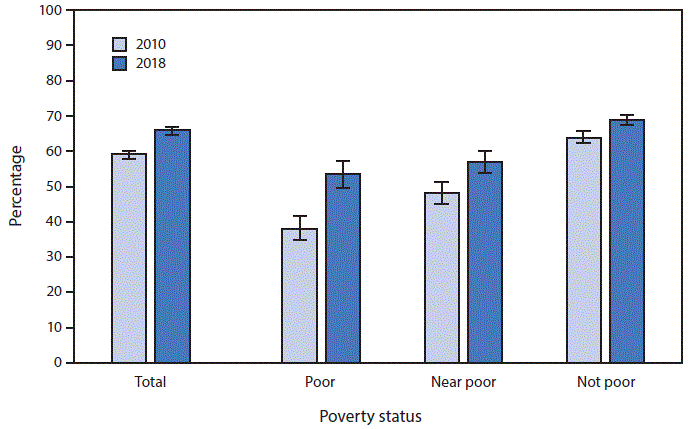QuickStats: Percentage* of Adults Aged 50–75 Years Who Received Colorectal Cancer Screening,† by Poverty Status§ and Year — National Health Interview Survey, United States, 2010 and 2018¶
Weekly / July 24, 2020 / 69(29);976

* With 95% confidence intervals indicated with error bars.
† Based on survey questions that included reports of home fecal occult blood test (FOBT) in the past year, sigmoidoscopy procedure in the past 5 years with FOBT in the past 3 years, or colonoscopy in the past 10 years. These procedures constituted the 2008 U.S. Preventive Services Task Force (USPSTF) screening recommendations for colorectal cancer. Estimates of colorectal cancer screening are consistent with the 2008 USPSTF recommendations and do not incorporate the new colorectal test types discussed in the more recent 2016 USPSTF screening recommendations (https://www.uspreventiveservicestaskforce.org/uspstf/recommendation/colorectal-cancer-screening).
§ Poverty status is determined by family income and family size using the U.S. Census Bureau’s poverty thresholds (https://www.census.gov/data/tables/time-series/demo/income-poverty/historical-poverty-thresholds.html). “Poor” persons are defined as those with incomes below the poverty threshold, “near poor” persons have incomes of 100% to <200% of the poverty threshold, and “not poor” persons have incomes of ≥200% of the poverty threshold.
¶ Estimates are based on household interviews of a sample of the noninstitutionalized U.S. civilian population.
The percentage of adults aged 50–75 years who received colorectal cancer tests or procedures increased from 58.7% in 2010 to 65.5% in 2018. The percentage increased from 2010 to 2018 in all income groups: from 37.9% to 53.1% among poor, 47.9% to 56.7% among near poor, and 63.6% to 68.7% among not poor adults. In both 2010 and 2018, the percentage of adults who received colorectal cancer screening was lowest among poor and highest among not poor adults.
Source: National Health Interview Survey, 2010 and 2018. https://www.cdc.gov/nchs/nhis.htm.
Reported by: Nazik Elgaddal, MS, nelgaddal@cdc.gov, 301-458-4538; Yelena Gorina, MPH, MS.
Suggested citation for this article: QuickStats: Percentage of Adults Aged 50–75 Years Who Received Colorectal Cancer Screening, by Poverty Status and Year — National Health Interview Survey, United States, 2010 and 2018. MMWR Morb Mortal Wkly Rep 2020;69:976. DOI: http://dx.doi.org/10.15585/mmwr.mm6929a6.
MMWR and Morbidity and Mortality Weekly Report are service marks of the U.S. Department of Health and Human Services.
Use of trade names and commercial sources is for identification only and does not imply endorsement by the U.S. Department of
Health and Human Services.
References to non-CDC sites on the Internet are
provided as a service to MMWR readers and do not constitute or imply
endorsement of these organizations or their programs by CDC or the U.S.
Department of Health and Human Services. CDC is not responsible for the content
of pages found at these sites. URL addresses listed in MMWR were current as of
the date of publication.
All HTML versions of MMWR articles are generated from final proofs through an automated process. This conversion might result in character translation or format errors in the HTML version. Users are referred to the electronic PDF version (https://www.cdc.gov/mmwr) and/or the original MMWR paper copy for printable versions of official text, figures, and tables.
Questions or messages regarding errors in formatting should be addressed to mmwrq@cdc.gov.